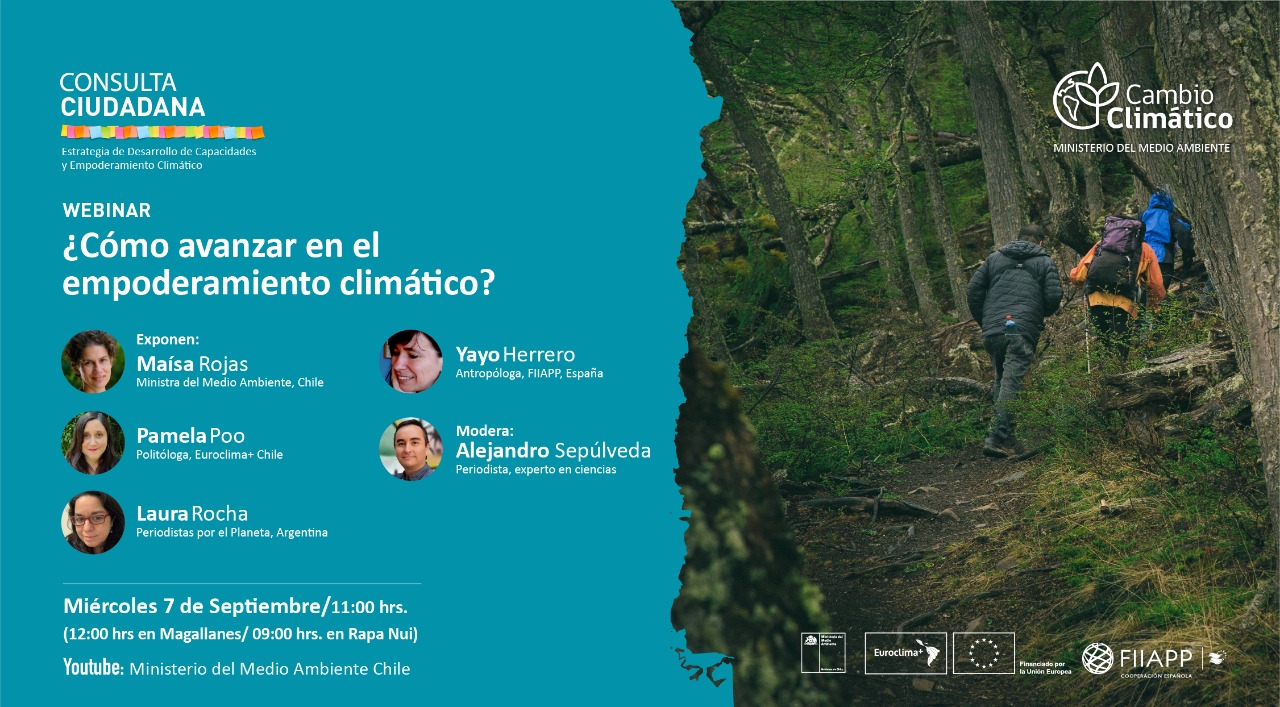An international webinar concluded the consultation process for the preparation of the Capacity Development and Climate Empowerment Strategy.
Santiago de Chile, 12 September.- On 7 September, a virtual meeting was held to present the main comments received by citizens on the proposed Strategy for Capacity Building and Climate Empowerment, which was submitted for public consultation between 16 May and 10 August this year.
The event was facilitated by Alejandro Sepúlveda, science journalist and content editor at CNN Chile and Chilevisión, and included the participation of Pamela Poo, Political Scientist and Master in Sociology, currently a FIIAPP advisor for Euroclima+, who presented the main findings of the public consultation process for the Strategy.
This was followed by an international panel discussion with the participation of three prominent panelists: Chile's Minister of Environment, Maisa Rojas, a scientist and academic who has dedicated her life to studying climate change and protecting the environment; Yayo Herrero, social anthropologist, agricultural engineer and social educator, FIIAPP / EUROCLIMA+ specialist in Action for Climate Empowerment; and Laura Rocha, Argentinean journalist, co-founder and president of Journalists for the Planet.
"Engaging all people in the challenges of climate change is a critical and unavoidable task."
The “Strategy for Capacity Building and Climate Empowerment” being developed by the Chilean government, at the request of the Ministry of Environment, seeks to involve people and organisations, both individually and as a whole, through actions that promote education, awareness, research and science, with public participation and access to information in a timely and understandable manner.
During her speech, Minister Maisa Rojas highlighted several elements of climate empowerment, associated with the six dimensions in which Article 6 of the UNFCCC is articulated: access to information, participation, training, education, awareness raising and international cooperation, integrated in both the Framework Law on Climate Change and the Escazu Agreement. She recalled the urgency to act and highlighted some of the principles integrated in the Law, such as scientific rigour, transparency, public participation, transversality and territoriality, as well as the fact that the Law integrates, with specific roles, both the Ministry of Education and the Ministry of Science, Technology, Innovation and Knowledge.
For her part, Yayo Herrero pointed out that "it is necessary to advance in the acquisition of a citizen climate competence that allows us to understand the causes of climate change, and at the same time activate actions that allow us to face it through a just transition".
"It is important that people organise themselves to tackle climate change".
Finally, Laura Rocha highlighted that Argentina, Chile and Uruguay have been making progress in collaborative and citizen work to design Climate Empowerment Strategies, and with a very similar political and organisational framework, to address the climate crisis accordingly. She also pointed out that the demands arise from society, and that it is necessary to approach citizens, who are experiencing a multidimensional crisis - social, economic and environmental - in order to address it from a just transition approach.
The ACE strategy is one of the instruments for implementing the Framework Law on Climate Change, as it guides the definition of measures associated with capacity building for climate change management instruments, such as sectoral mitigation and/or adaptation plans, regional climate change action plans, or community climate change plans.
The entire process of drafting this instrument has been constantly supported by the Euroclima+ programme through the International and Ibero-America Foundation for Administration and Public Policy (FIIAPP).
Vídeo Summary of the participatory process
About EUROCLIMA+
EUROCLIMA+ is a programme funded by the European Union to promote environmentally sustainable and climate-resilient development in 18 Latin American countries, in particular for the benefit of the most vulnerable populations. The Programme is implemented under the synergistic work of seven agencies: the Spanish Agency for International Development Cooperation (AECID), the French Development Agency (AFD), the Economic Commission for Latin America and the Caribbean (ECLAC), the German Society for International Cooperation (GIZ) GmbH, Expertise France (EF), the International and Ibero-America Foundation for Administration and Public Policy (FIIAPP), and UN Environment.
Contact
Daniel Fernández This email address is being protected from spambots. You need JavaScript enabled to view it.

